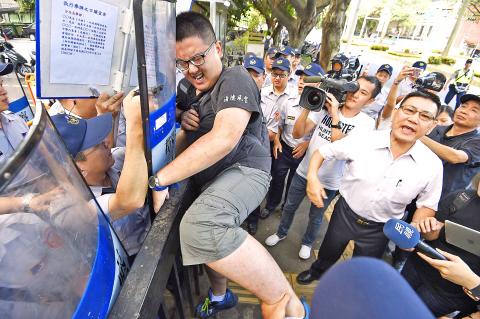In an apparent attempt to petition Minister of Education Wu Se-hwa (吳思華) over a set of controversial adjustments to high-school curriculum guidelines, a high-school student yesterday managed to break through a police cordon in front of the ministry’s building in Taipei, but was handcuffed and detained.
Yu Teng-chieh (游騰傑), who was later released, participated in the demonstration with a group of Taoyuan high-school students rallying in front of the ministry yesterday in an ongoing protest organized by students nationwide against curricular adjustments.
Rather than Wu, K-12 Education Administration inspector Hsu Chen-hsing (許陣興) heard the grievances, but students threatened to stage another protest at dusk if the ministry failed to respond to their request by 5pm yesterday.

Photo: Chen Chih-chu, Taipei Times
The ministry modified the curricula in a “clandestine” manner, while trying to shift blame to high-school principals for canceling meetings with students over the adjustments last month, the students said.
Students scuffled with dozens of officers who formed a blockade in front of the ministry headquarters.
Outnumbered and obstructed, students retreated and accused the ministry of using barbed wire fences against unarmed and underage students who wanted to speak to Wu.
Separately, the History Teachers Deep Roots Association said in a statement that Wu must recognize that “a new generation is on the rise,” and the ministry’s lack of response and reiteration of excuses would only inspire more protesters.
“Should you [Wu] resort to state violence against those unarmed students, teachers would fight against you with their lives,” the association said.
Wu’s failure to respond to protesters’ petitions has cost him respect and trust among academics, history teachers and high-school students alike, the association said.
The adjusted guideines that Wu described as “constitutional and legal” have not been examined by an open adjustment process, the association said.
“This year’s curriculum is like a spoiled wine that the ministry, abusing its authority, nevertheless serves to teachers and students and forces them to drink,” the association said.
The association questioned Wu’s claim that the new curriculum would be implemented along with the old one, saying that this “cocktail of rancid wines” would be more unpalatable than the old curriculum, which was rushed through by the curriculum review committee in 2012.
Education must allow room for tolerance and pluralism, which are exactly what are wanted in the new guidelines, the association said.
“Why are students forced to accept the new curriculum, whose contentious nature and historical inaccuracy Wu acknowledged? Is it so difficult to respect teachers’ professionalism? Do high-school students not deserve a better history education?” the association wrote.
Saying that it disapproves of the co-implementation of new and old curricula, the association called for a more transparent and appropriate history curriculum adjustment and review process, uninfluenced by political wrestling.
Speaking to legislators across party lines, the association said that the Chinese Nationalist Party (KMT) legislators should “wake up” in the face of Wu’s dereliction and the Democratic Progressive Party lawmakers have failed their duty to supervise the adjustments.
The association called for an end to “drastically changing textbook contents with each transfer of [governmental] power.”

Taipei has once again made it to the top 100 in Oxford Economics’ Global Cities Index 2025 report, moving up five places from last year to 60. The annual index, which was published last month, evaluated 1,000 of the most populated metropolises based on five indices — economics, human capital, quality of life, environment and governance. New York maintained its top spot this year, placing first in the economics index thanks to the strength of its vibrant financial industry and economic stability. Taipei ranked 263rd in economics, 44th in human capital, 15th in quality of life, 284th for environment and 75th in governance,

Greenpeace yesterday said that it is to appeal a decision last month by the Taipei High Administrative Court to dismiss its 2021 lawsuit against the Ministry of Economic Affairs over “loose” regulations governing major corporate electricity consumers. The climate-related lawsuit — the first of its kind in Taiwan — sought to require the government to enforce higher green energy thresholds on major corporations to reduce emissions in light of climate change and an uptick in extreme weather. The suit, filed by Greenpeace East Asia, the Environmental Jurists Association and four individual plaintiffs, was dismissed on May 8 following four years of litigation. The

A former officer in China’s People’s Liberation Army (PLA) who witnessed the aftermath of the 1989 Tiananmen Square massacre has warned that Taiwan could face a similar fate if China attempts to unify the country by force. Li Xiaoming (李曉明), who was deployed to Beijing as a junior officer during the crackdown, said Taiwanese people should study the massacre carefully, because it offers a glimpse of what Beijing is willing to do to suppress dissent. “What happened in Tiananmen Square could happen in Taiwan too,” Li told CNA in a May 22 interview, ahead of the massacre’s 36th anniversary. “If Taiwanese students or

The New Taipei City Government would assist relatives of those killed or injured in last month’s car-ramming incident in Sansia District (三峽) to secure compensation, Mayor Hou You-yi (侯友宜) said yesterday, two days after the driver died in a hospital. “The city government will do its best to help the relatives of the car crash incident seek compensation,” Hou said. The mayor also said that the city’s Legal Affairs, Education and Social Welfare departments have established a joint mechanism to “provide coordinated assistance” to victims and their families. Three people were killed and 12 injured when a car plowed into schoolchildren and their